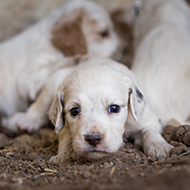Kennel Club research finds rise in rogue puppy breeders

The research found that 72 per cent of puppy owners weren't asked about their suitability for ownership, indicating a rising likelihood of impulse purchases.
The practice of buying puppies on social media has seen a three-fold increase, new research has revealed, enabling sellers to hide poor breeding conditions and leading to health and welfare issues.
Conducted by The Kennel Club, the research found a range of concerning practices in dog breeding and selling, leading the organisation to warn of an 'unprecedented welfare disaster' if this continues.
Prompted by these findings, The Kennel Club has launched a 'Be Puppywise' campaign, with advice and resources available to encourage responsible puppy buying and breeding.
Key findings showed that one in three people admitted to not seeing their puppy in person before purchasing, with nearly a quarter of people (23 per cent) having their puppy delivered or picked up from a neutral location.
Surveying owners of puppies bought virtually, The Kennel Club found that one-third developed unexpected behavioural issues and had double the number of trips to the vet for non-routine treatment and checks in their first year.
Chief executive at The Kennel Club, Mark Beazley, said: “Thousands of puppies and dog owners are suffering and this research really does show a damning portrait of our puppy buying nation.
“The virtual puppy buying habits that were normalised during lockdown – which have enabled shady breeders to thrive – have combined in a perfect and terrible storm with the cost of living crisis.
“This means that thousands of people who have been duped are now struggling to care for dogs with health and behavioural problems, who are sadly the victims of this unprecedented set of circumstances.”
Shockingly, the study found that 22 per cent of puppies become sick or die before their first birthday, and this increases to 36 per cent if the puppy was not seen in real life prior to purchasing.
The Kennel Club has identified a lack of buyer awareness as the main reason that rogue dog breeding is growing, with one-third of owners admitting that they didn't know the signs of a puppy farm, and 25 per cent suspecting their their breeder may be operating illegally.
Research also found that 44 per cent of owners said that they bought their dog via an advert with red flag words, such as 'ready to go now' or 'puppy delivery available'.
Mr Beazley continued: “With the world of puppy breeding and buying getting more and more difficult to navigate, it’s crucial that would-be owners know exactly what to look for when buying a puppy.
“Puppy buyers should be cautious of adverts using words that try to lure you in with promises of ‘rare’ or ‘exotic’ dogs, or a quick sale, as a good breeder, such as a Kennel Club Assured Breeder, will always ask questions about your suitability for dog ownership, and you will often need to be prepared to go on a waiting list.
“You should see the puppy interacting with its mum, where it was bred and reared in real life, so clever guises, marketing ploys or tactics to disguise a puppy’s true background to simply make a huge profit, are exposed.”



 The RCVS has announced a new version of its 1CPD mobile app, with enhanced features for veterinary surgeons and veterinary nurses to record their continuing professional development.
The RCVS has announced a new version of its 1CPD mobile app, with enhanced features for veterinary surgeons and veterinary nurses to record their continuing professional development.